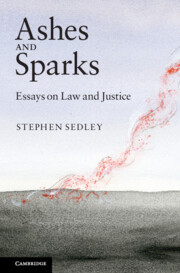Book contents
- Frontmatter
- Contents
- Preface
- Acknowledgements
- PART I History
- PART II Law
- 12 Justice miscarried
- 13 Breaking the law
- 14 Declining the brief
- 15 Big lawyers and little lawyers
- 16 Parliament, government, courts
- 17 Judges in lodgings
- 18 Mice peeping out of oakum
- 19 Justice in Chile
- 20 Never do anything for the first time
- 21 Rarely pure and never simple
- 22 Law and plumbing
- 23 The Laws of Documents
- PART III Justice
- Index
15 - Big lawyers and little lawyers
Published online by Cambridge University Press: 05 June 2012
- Frontmatter
- Contents
- Preface
- Acknowledgements
- PART I History
- PART II Law
- 12 Justice miscarried
- 13 Breaking the law
- 14 Declining the brief
- 15 Big lawyers and little lawyers
- 16 Parliament, government, courts
- 17 Judges in lodgings
- 18 Mice peeping out of oakum
- 19 Justice in Chile
- 20 Never do anything for the first time
- 21 Rarely pure and never simple
- 22 Law and plumbing
- 23 The Laws of Documents
- PART III Justice
- Index
Summary
This was a review, published in the London Review of Books in 1996, of Lord Woolf's final report on the reshaping of civil justice and of a book by his IT consultant, Richard Susskind, on the challenges posed by IT technology to the future of the law.
The fate of the Hong Kong project to codify the common law in time for the handover was not as final as I thought. It was restarted, and I now have on my shelf the first complete codification of the English common law. But not in English.
It will soon be two hundred years since Napoleon, as First Consul, appointed four not especially distinguished lawyers to sit down and codify the entire heterogeneous mass of French civil law. They were appointed in August 1800 and by February 1801 had produced and published a complete draft of the Civil Code. After taking the views of the judges and the Tribunal, Napoleon chaired nearly half of the 123 subsequent redrafting sessions of the Conseil d'Etat, some lasting from noon to dawn, repeatedly insisting that detailed prescriptions would be self-defeating and that the right method was to set out the goals the courts were to achieve. By the spring of 1804 the whole project was law.
The fresh codification now under way under the great conseiller Braibant is the task of a decade where Bonaparte's commissioners took little more than four months.
- Type
- Chapter
- Information
- Ashes and SparksEssays On Law and Justice, pp. 161 - 169Publisher: Cambridge University PressPrint publication year: 2011



